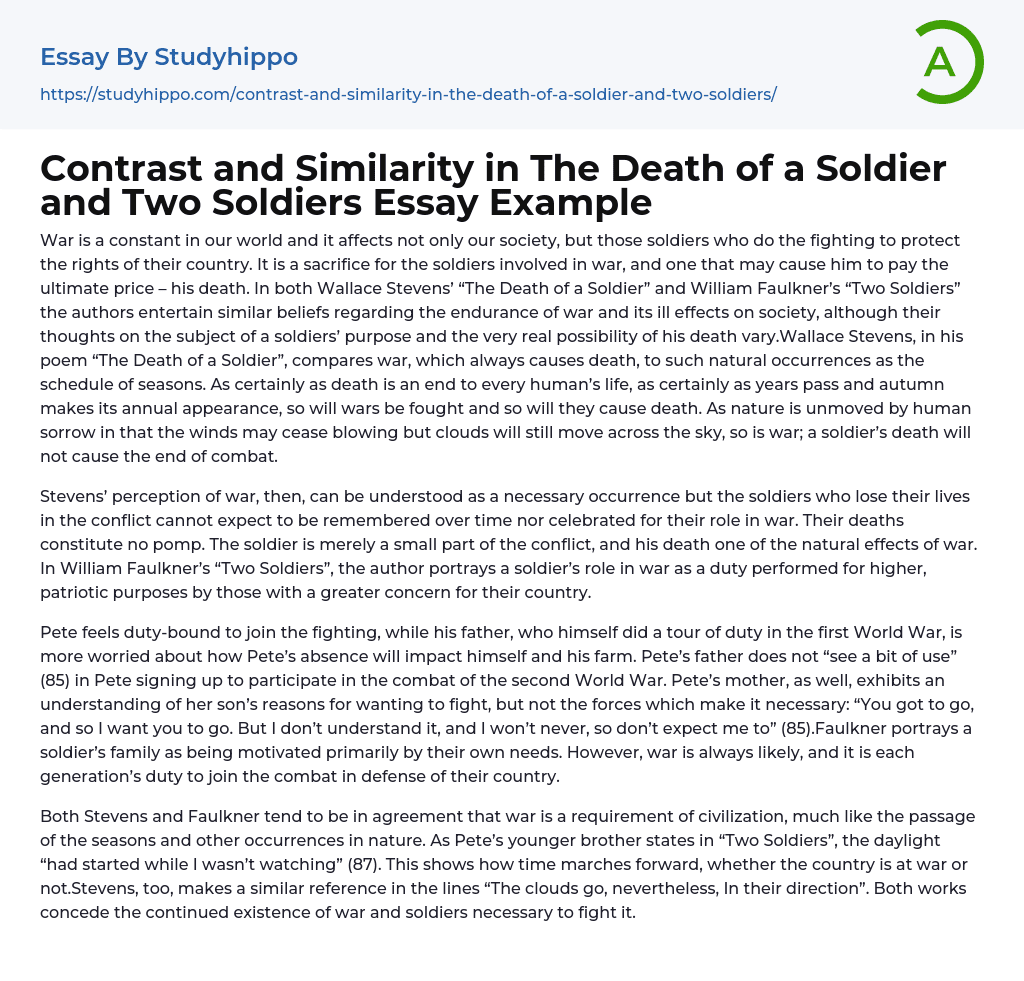

Contrast and Similarity in The Death of a Soldier and Two Soldiers Essay Example
War is a constant in our world and it affects not only our society, but those soldiers who do the fighting to protect the rights of their country. It is a sacrifice for the soldiers involved in war, and one that may cause him to pay the ultimate price – his death. In both Wallace Stevens’ “The Death of a Soldier” and William Faulkner’s “Two Soldiers” the authors entertain similar beliefs regarding the endurance of war and its ill effects on society, although their thoughts on the subject of a soldiers’ purpose and the very real possibility of his death vary.Wallace Stevens, in his poem “The Death of a Soldier”, compares war, which always causes death, to such natural occurrences as the schedule of seasons. As certainly as death is an end to every human’s life,
...as certainly as years pass and autumn makes its annual appearance, so will wars be fought and so will they cause death. As nature is unmoved by human sorrow in that the winds may cease blowing but clouds will still move across the sky, so is war; a soldier’s death will not cause the end of combat.
Stevens’ perception of war, then, can be understood as a necessary occurrence but the soldiers who lose their lives in the conflict cannot expect to be remembered over time nor celebrated for their role in war. Their deaths constitute no pomp. The soldier is merely a small part of the conflict, and his death one of the natural effects of war. In William Faulkner’s “Two Soldiers”, the author portrays a soldier’s role in war as a duty performed for higher, patriotic purposes b
those with a greater concern for their country.
Pete feels duty-bound to join the fighting, while his father, who himself did a tour of duty in the first World War, is more worried about how Pete’s absence will impact himself and his farm. Pete’s father does not “see a bit of use” (85) in Pete signing up to participate in the combat of the second World War. Pete’s mother, as well, exhibits an understanding of her son’s reasons for wanting to fight, but not the forces which make it necessary: “You got to go, and so I want you to go. But I don’t understand it, and I won’t never, so don’t expect me to” (85).Faulkner portrays a soldier’s family as being motivated primarily by their own needs. However, war is always likely, and it is each generation’s duty to join the combat in defense of their country.
Both Stevens and Faulkner tend to be in agreement that war is a requirement of civilization, much like the passage of the seasons and other occurrences in nature. As Pete’s younger brother states in “Two Soldiers”, the daylight “had started while I wasn’t watching” (87). This shows how time marches forward, whether the country is at war or not.Stevens, too, makes a similar reference in the lines “The clouds go, nevertheless, In their direction”. Both works concede the continued existence of war and soldiers necessary to fight it.
Of the two authors, Faulkner endorses patriotism. In portraying two generations of soldiers, he underscores the fact that the father no longer believes blindly in a soldier’s heroism while Pete is so full of patriotism he inspires his younger brother
to feel the same. Conversely, Stevens emphasizes that a soldier’s death on the battlefield occurs without fanfare and the soldier’s patriotism makes no difference in regards to a war’s resolution.Both Stevens’ and Faulkner’s works represent the concept that a certain reciprocity between a soldier’s heroism and his country’s victory in war exists.
The soldier surely risks his life in defense of his country but his country would be at great risk without realizing a victory in war. As a compulsory part of life and society, war will cause the deaths of soldiers, whether the soldier’s motivation is due to love of country or simply the duty he feels to perform his part.
- Values of Life essays
- Ethical dilemma essays
- Normative Ethics essays
- Virtue Ethics essays
- Belief essays
- Deontology essays
- Moral essays
- Virtue essays
- Work Ethic essays
- Leader essays
- Biography essays
- Power essays
- Superhero essays
- Mission essays
- Purpose essays
- Helping Others essays
- Actions essays
- World War I essays
- World War Ii essays
- Atomic Bomb essays
- American Civil War essays
- Attack essays
- Cold War essays
- Crimean War essays
- Emilio Aguinaldo essays
- Iraq War essays
- Korean War essays
- Nazism essays
- Nuclear Weapon essays
- Philippine Revolution essays
- Trench Warfare essays
- Vietnam War essays
- Western Front essays
- Diplomacy essays
- Emperor essays
- Rwanda essays
- Tribe essays
- Revolutionary War essays
- War of 1812 essays
- Mexican American War essays
- Hitler essays
- The Spanish American War essays
- League Of Nations essays
- Battle Of The Somme essays
- Treaty Of Versailles essays
- Fascism essays
- D-day essays
- Atomic Physics essays
- Atomic Bombings Of Hiroshima And Nagasaki essays
- Electron essays



